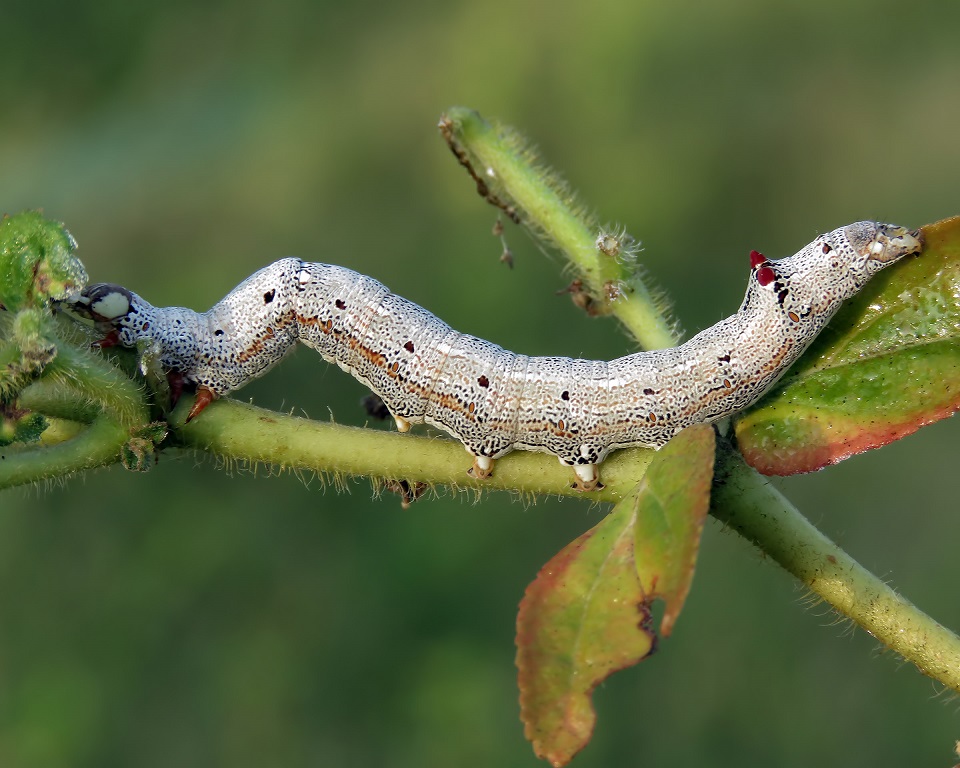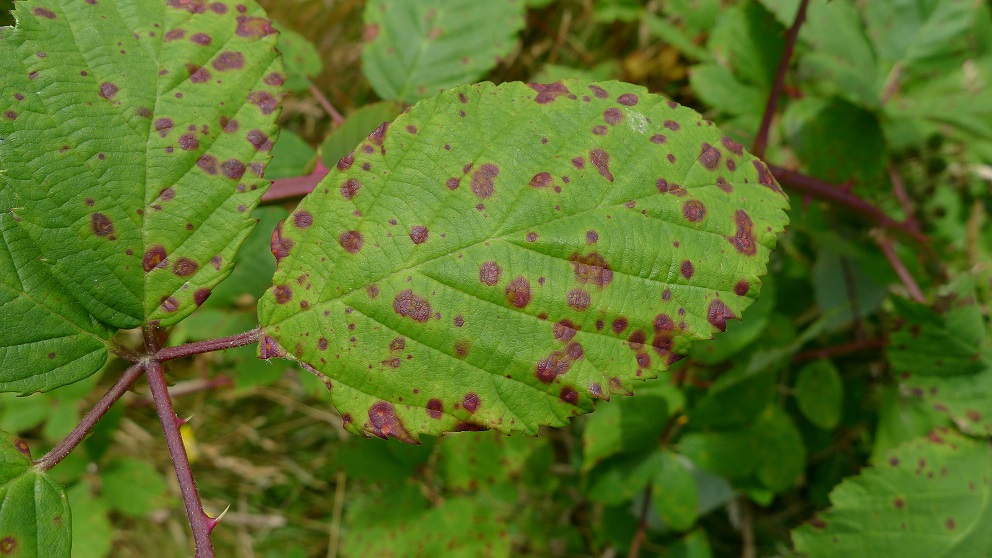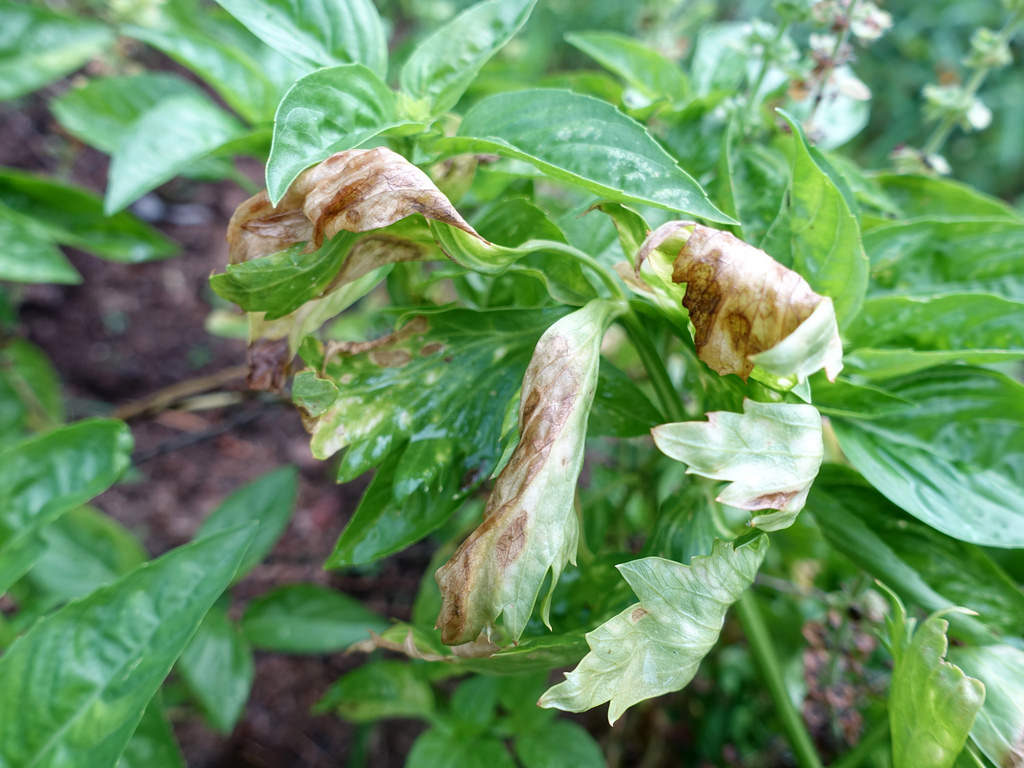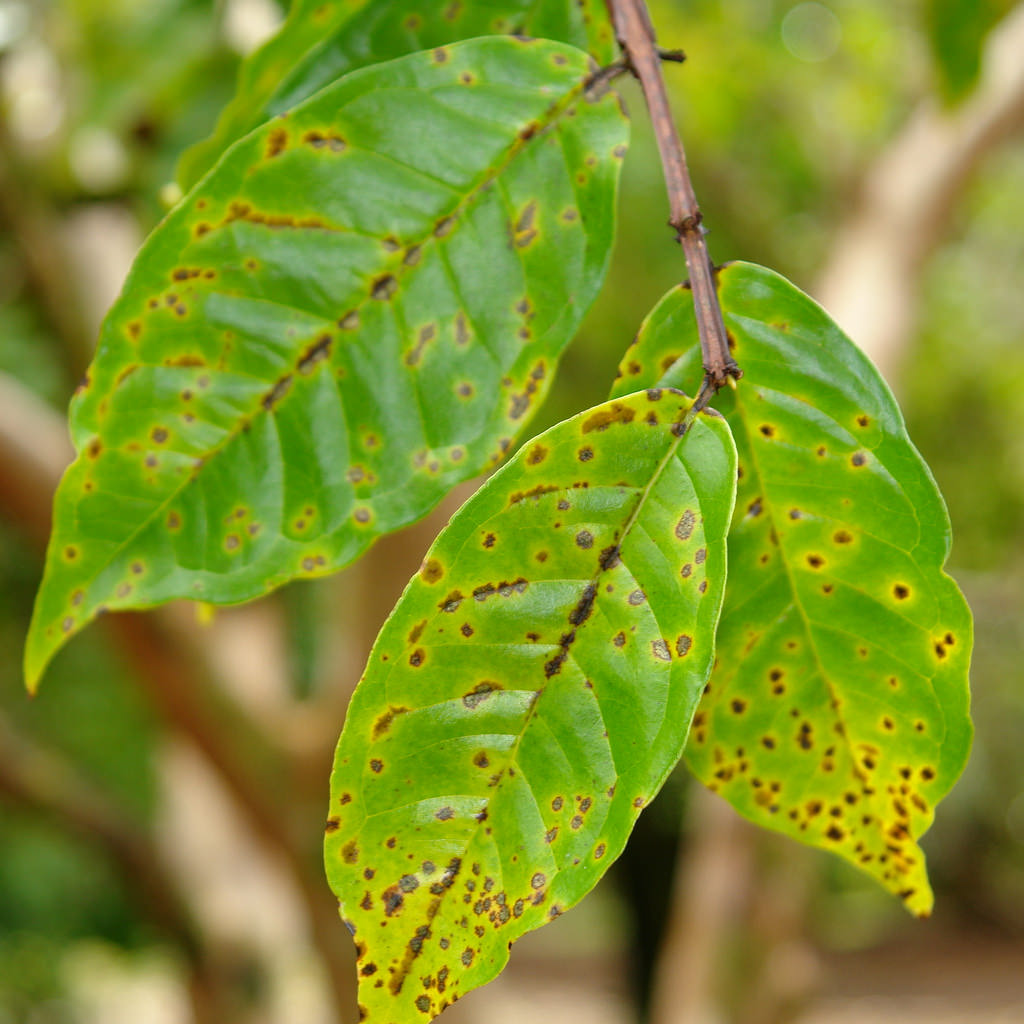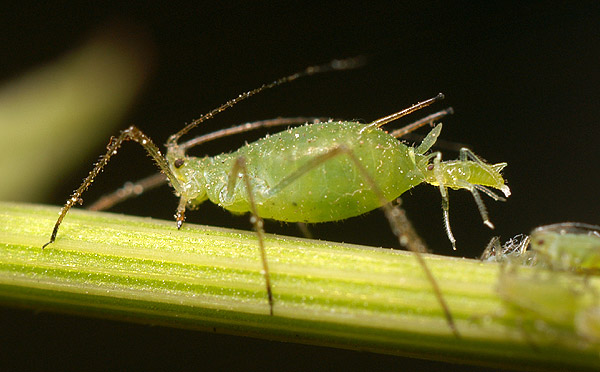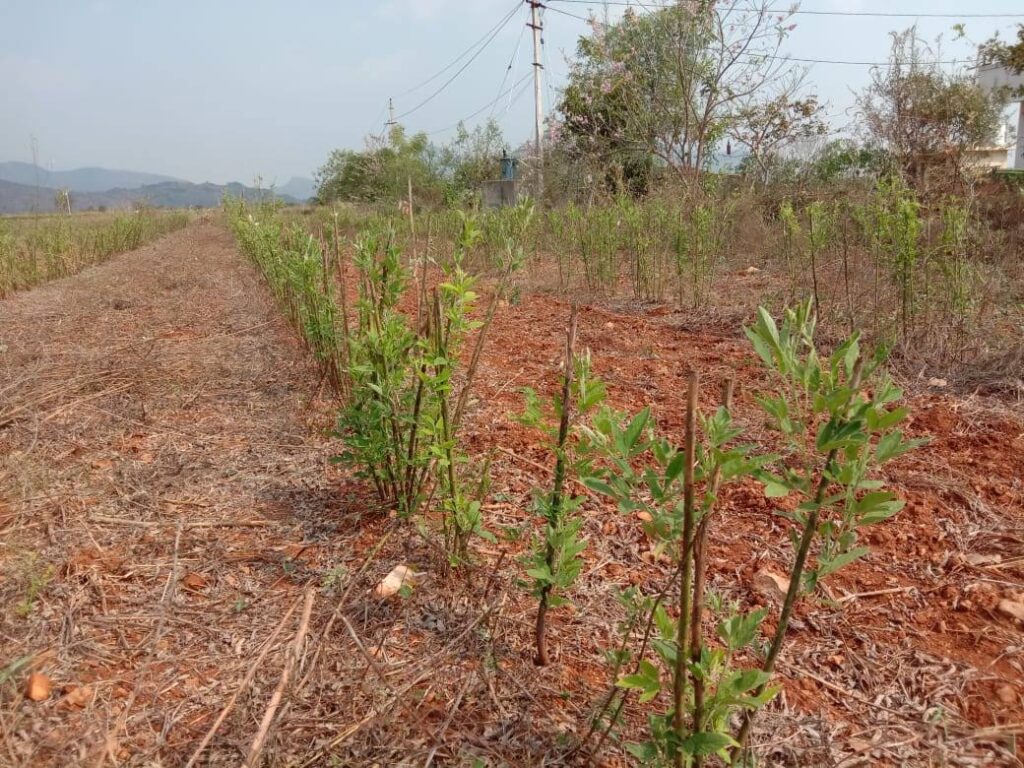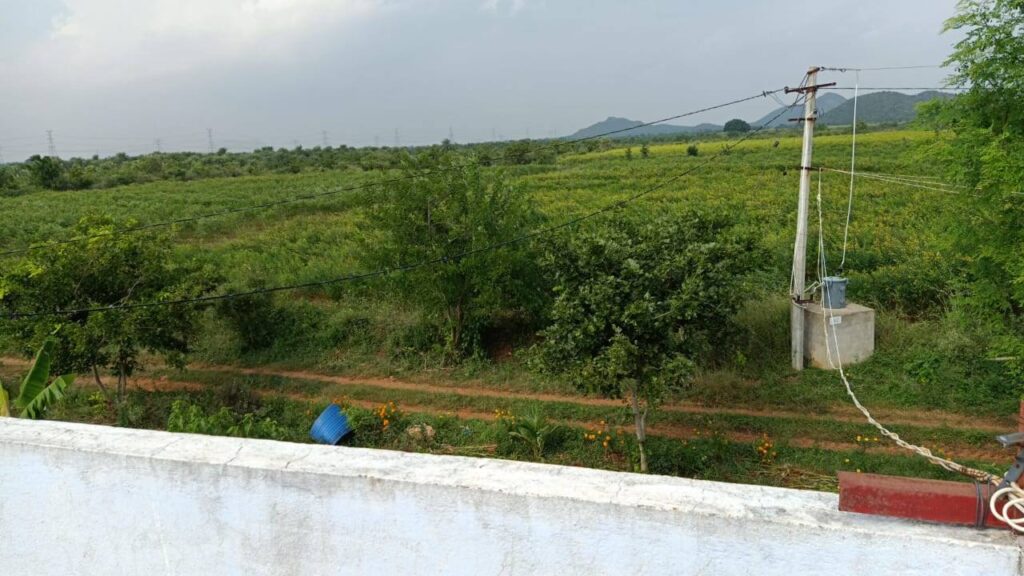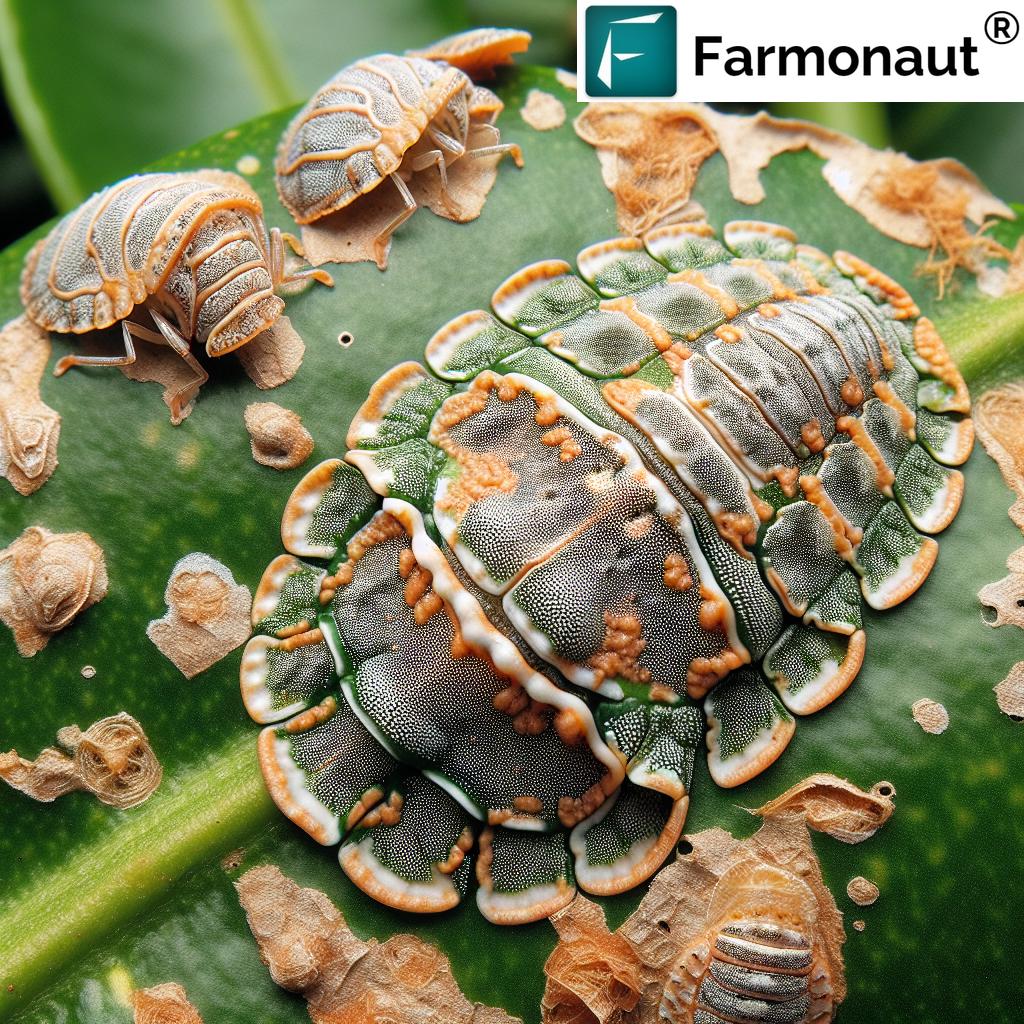
Organic Pest Control: Battling Armored Scale Insects on Citrus Plants Without Chemicals
In the world of citrus cultivation, one of the most persistent and challenging pests that growers face is the armored scale insect. These tiny yet formidable insects can wreak havoc on citrus plants, causing significant damage to foliage, twigs, and fruits. As advocates for sustainable agriculture, we at Farmonaut understand the importance of finding effective organic solutions to combat these pests without resorting to harmful chemical treatments. In this comprehensive guide, we’ll explore the world of armored scale insects, their impact on citrus crops, and most importantly, how to implement successful organic pest control strategies.
Understanding Armored Scale Insects
Before we delve into control methods, it’s crucial to understand the nature of our adversary. Armored scale insects are small, immobile pests that attach themselves to various parts of citrus plants. They derive their name from the hard, protective shield they develop, which makes them particularly resilient to many pest control methods.
Life Cycle of Armored Scale Insects
- Egg Stage: Female scales lay eggs beneath their protective covering.
- Crawler Stage: Upon hatching, the young scales enter the mobile crawler stage.
- Settlement: Crawlers move to new feeding sites on the plant.
- Development: They begin secreting their protective shield and become immobile.
- Maturity: Adult scales continue feeding and reproducing, completing the cycle.
Damage Caused by Armored Scale Insects
The impact of armored scale infestations on citrus plants can be severe:
- Yellowing and dropping of foliage
- Dieback of twigs and branches
- Reduced fruit quality and yield
- Weakening of the overall plant health
- Potential death of the plant in severe cases
The Shift Towards Organic Pest Control
In recent years, there has been a significant shift away from conventional chemical pest control methods towards more sustainable, organic approaches. This change is driven by several factors:
- Increased awareness of environmental impacts
- Consumer demand for organic produce
- Concerns about pesticide residues on food
- The development of pesticide-resistant pests
- Stricter regulations on chemical pesticide use
At Farmonaut, we strongly advocate for this transition to organic pest control, especially when it comes to managing armored scale insects on citrus plants. Our satellite-based crop monitoring technology plays a crucial role in supporting this shift by providing early detection and targeted intervention strategies.
Organic Control Strategies for Armored Scale Insects
Now, let’s explore the various organic methods we can employ to combat armored scale infestations on citrus plants:
1. Cultural Control Methods
Cultural control involves modifying the growing environment to make it less favorable for pest development:
- Proper pruning to improve air circulation
- Adequate plant spacing to reduce pest spread
- Maintaining optimal plant health through proper nutrition and irrigation
- Removing and destroying heavily infested plant parts
2. Mechanical Control
Physical removal of pests can be effective, especially for small-scale operations:
- Scrubbing affected areas with a soft brush
- Using high-pressure water sprays to dislodge scales
- Pruning and destroying heavily infested branches
3. Biological Control
Encouraging natural predators and parasites of armored scale insects can provide long-term control:
- Introducing predatory insects like ladybugs and lacewings
- Encouraging parasitic wasps that target scale insects
- Creating habitat for beneficial insects in the orchard
4. Organic Insecticidal Treatments
When other methods are insufficient, organic insecticides can be used:
- Horticultural oils (e.g., neem oil, mineral oil)
- Insecticidal soaps
- Diatomaceous earth
- Botanical insecticides (e.g., pyrethrins)
Implementing an Integrated Organic Pest Management Strategy
At Farmonaut, we recommend an integrated approach to organic pest management for armored scale insects. This strategy combines multiple control methods for maximum effectiveness while minimizing environmental impact:
- Monitoring: Regular inspection of citrus plants for early signs of infestation.
- Prevention: Implementing cultural control methods to create an unfavorable environment for pests.
- Early Intervention: Using mechanical control and organic treatments at the first sign of infestation.
- Biological Control: Encouraging and introducing natural predators.
- Targeted Treatment: Applying organic insecticides only when necessary and in a targeted manner.
The Role of Technology in Organic Pest Management
At Farmonaut, we leverage advanced satellite technology to enhance organic pest management strategies. Our satellite-based crop monitoring system offers several advantages:
- Early detection of stress patterns indicative of pest infestations
- Precise mapping of affected areas for targeted treatments
- Monitoring of treatment effectiveness over time
- Data-driven insights for optimizing pest control strategies
By integrating our technology with organic pest control methods, growers can achieve more effective and efficient management of armored scale insects on their citrus plants.

Comparison: Traditional vs. Organic vs. Farmonaut-Assisted Pest Control
| Aspect | Traditional Chemical Control | Organic Control | Farmonaut-Assisted Organic Control |
|---|---|---|---|
| Detection Method | Visual inspection | Regular monitoring | Satellite-based early detection |
| Treatment Approach | Broad-spectrum chemical applications | Targeted organic treatments | Precision-targeted organic treatments |
| Environmental Impact | High | Low | Minimal |
| Cost Effectiveness | Variable | Moderate | High |
| Long-term Sustainability | Low | High | Very High |
| Data-Driven Insights | Limited | Moderate | Extensive |
Best Practices for Organic Armored Scale Control
To maximize the effectiveness of organic control methods against armored scale insects on citrus plants, consider the following best practices:
1. Timing is Crucial
The success of many organic treatments depends on proper timing:
- Target treatments during the vulnerable crawler stage
- Apply horticultural oils during dormant seasons for better coverage
- Coordinate biological control releases with pest life cycles
2. Thorough Coverage is Essential
Ensure complete coverage when applying organic treatments:
- Spray both upper and lower leaf surfaces
- Pay special attention to twigs and branches
- Repeat applications as necessary to target newly hatched crawlers
3. Regular Monitoring and Assessment
Continuous vigilance is key to successful pest management:
- Conduct weekly inspections during growing seasons
- Use magnifying glasses to spot early signs of infestation
- Leverage Farmonaut’s satellite monitoring for large-scale operations
4. Maintain Plant Health
Healthy plants are more resistant to pest infestations:
- Ensure proper nutrition through organic fertilization
- Maintain optimal soil health and irrigation practices
- Avoid over-fertilization, which can attract pests
5. Encourage Biodiversity
A diverse ecosystem supports natural pest control:
- Plant companion crops that attract beneficial insects
- Create habitat zones for natural predators
- Minimize the use of broad-spectrum organic insecticides that may harm beneficial insects
Challenges in Organic Armored Scale Control
While organic control methods offer numerous benefits, they also present certain challenges:
1. Slower Action
Organic treatments often work more slowly than chemical alternatives, requiring patience and persistence.
2. Weather Dependency
Many organic treatments are affected by weather conditions, necessitating careful timing and potentially more frequent applications.
3. Labor Intensity
Some organic methods, particularly mechanical control, can be labor-intensive and time-consuming.
4. Regulatory Compliance
Ensuring compliance with organic certification standards while maintaining effective pest control can be challenging.
The Future of Organic Pest Control in Citrus Production
As we look to the future, several trends are shaping the landscape of organic pest control for citrus plants:
1. Advanced Biological Control Agents
Research into more effective and targeted biological control agents is ongoing, promising new tools for organic growers.
2. Improved Organic Formulations
The development of more potent and longer-lasting organic insecticides is enhancing the efficacy of organic pest control.
3. Integration of Technology
The increasing adoption of technologies like Farmonaut’s satellite monitoring is revolutionizing pest management strategies in organic citrus production.
4. Climate Change Adaptation
As climate patterns shift, organic pest control strategies are evolving to address new challenges and changing pest behaviors.
Conclusion
Managing armored scale insects on citrus plants through organic methods is not just possible; it’s increasingly becoming the preferred approach for sustainable agriculture. By combining traditional organic practices with cutting-edge technology like Farmonaut’s satellite monitoring, growers can effectively control these persistent pests while maintaining the health of their crops and the environment.
As we continue to face challenges in agriculture, from climate change to evolving pest pressures, the importance of sustainable, organic approaches cannot be overstated. At Farmonaut, we’re committed to supporting growers in their transition to more sustainable practices, providing the tools and insights needed to succeed in organic citrus production.
By embracing these organic control methods and leveraging technological advancements, we can ensure a healthier, more sustainable future for citrus production worldwide. Together, we can cultivate resilient, productive orchards that thrive in harmony with nature, producing the high-quality citrus fruits that consumers demand, all while preserving our precious ecosystems for generations to come.
FAQs
Q1: How can I identify armored scale insects on my citrus plants?
A1: Look for small, immobile bumps on twigs, foliage, and fruits. They often appear as crusty or scaly patches and may cause yellowing of leaves or dieback of branches.
Q2: Are organic treatments as effective as chemical pesticides against armored scale?
A2: While organic treatments may work more slowly, they can be equally effective when applied correctly and consistently. They also offer the benefits of being environmentally friendly and safe for beneficial insects.
Q3: How often should I apply organic treatments for armored scale control?
A3: The frequency depends on the specific treatment and severity of infestation. Generally, applications every 7-14 days during active crawler periods are recommended. Always follow product instructions and adjust based on monitoring results.
Q4: Can Farmonaut’s satellite monitoring detect armored scale infestations?
A4: Yes, Farmonaut’s technology can detect stress patterns in crops that may indicate pest infestations, including armored scale. This allows for early intervention and targeted treatment.
Q5: Is it possible to completely eradicate armored scale insects organically?
A5: Complete eradication is challenging, but effective organic management can keep populations below damaging levels. The goal is to maintain a balance where pests are controlled without harming beneficial insects or the environment.


